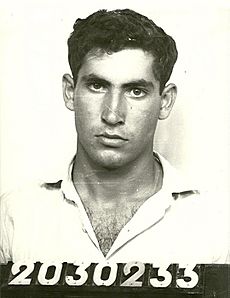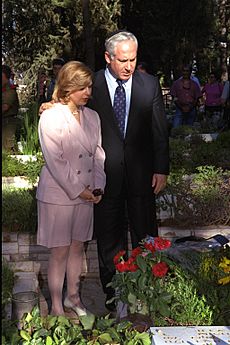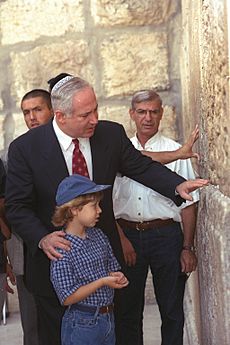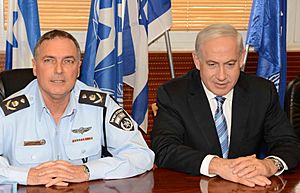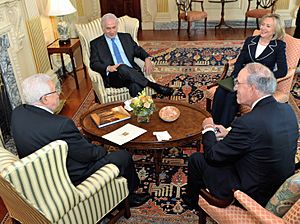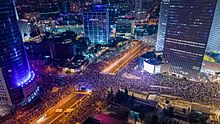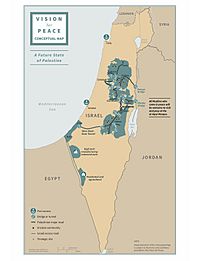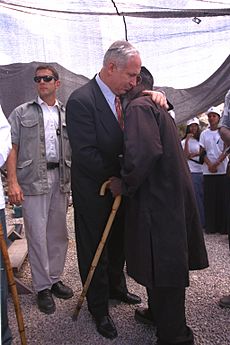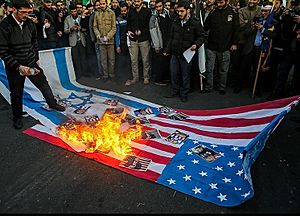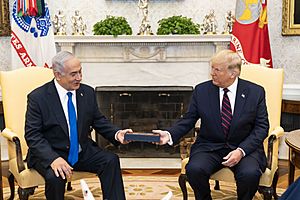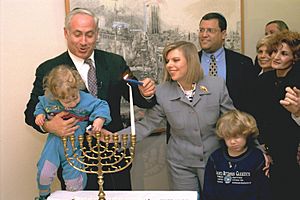Benjamin Netanyahu facts for kids
Quick facts for kids
Benjamin Netanyahu
|
|
|---|---|
|
בִּנְיָמִין נְתַנְיָהוּ
|
|
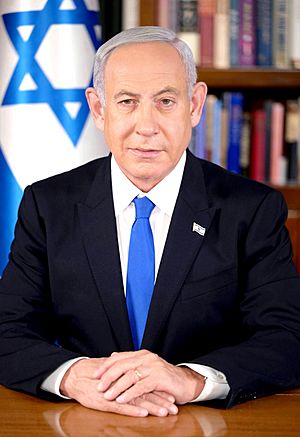
Official portrait, 2023
|
|
| Prime Minister of Israel | |
| Assumed office 29 December 2022 |
|
| President | Isaac Herzog |
| Deputy | Yariv Levin |
| Preceded by | Yair Lapid |
| In office 31 March 2009 – 13 June 2021 |
|
| President | |
| Alternate | Benny Gantz (2020–2021) |
| Preceded by | Ehud Olmert |
| Succeeded by | Naftali Bennett |
| In office 18 June 1996 – 6 July 1999 |
|
| President | Ezer Weizman |
| Preceded by | Shimon Peres |
| Succeeded by | Ehud Barak |
| Leader of the Opposition | |
| In office 28 June 2021 – 29 December 2022 |
|
| Prime Minister |
|
| Preceded by | Yair Lapid |
| Succeeded by | Yair Lapid |
| In office 16 January 2006 – 31 March 2009 |
|
| Prime Minister | Ehud Olmert |
| Preceded by | Amir Peretz |
| Succeeded by | Tzipi Livni |
| In office 3 February 1993 – 18 June 1996 |
|
| Prime Minister |
|
| Preceded by | Yitzhak Shamir |
| Succeeded by | Shimon Peres |
| Chairman of Likud | |
| Assumed office 20 December 2005 |
|
| Preceded by | Ariel Sharon |
| In office 3 February 1993 – 6 July 1999 |
|
| Preceded by | Yitzhak Shamir |
| Succeeded by | Ariel Sharon |
| Permanent Representative of Israel to the United Nations | |
| In office 1 September 1984 – 1 March 1988 |
|
| Prime Minister |
|
| Preceded by | Yehuda Blum |
| Succeeded by | Yohanan Bein |
| Ministerial roles | |
| 1996–1997 | Science and Technology |
| 1996–1999 | Housing and Construction |
| 2002–2003 | Foreign Affairs |
| 2003–2005 | Finance |
| 2009–2013 |
|
| 2012–2013 | Foreign Affairs |
| 2013 |
|
| Personal details | |
| Born | 21 October 1949 Tel Aviv, Israel |
| Political party | Likud (since 1988) |
| Other political affiliations |
Herut (until 1988) |
| Spouses |
|
| Children | 3 (including Yair) |
| Parents |
|
| Relatives |
|
| Education | |
| Occupation |
|
| Cabinet |
|
| Awards | Jabotinsky Medal (1980) |
| Signature |  |
| Nickname | Bibi |
| Military service | |
| Branch/service | Israel Defense Forces |
| Years of service | 1967–1973 |
| Rank | Séren (Captain) |
| Unit | Sayeret Matkal |
| Battles/wars |
|
Benjamin "Bibi" Netanyahu (born 21 October 1949) is an Israeli politician and diplomat. He has served as Prime Minister of Israel since December 2022. Before this, he was prime minister from 1996 to 1999 and again from 2009 to 2021. This makes him Israel's longest-serving prime minister.
Netanyahu was born in Tel Aviv and grew up in West Jerusalem and the United States. He joined the Israel Defense Forces in 1967, serving in a special forces unit called Sayeret Matkal. After studying at the Massachusetts Institute of Technology, he worked as a consultant. He returned to Israel in 1978 to start the Yonatan Netanyahu Anti-Terror Institute. From 1984 to 1988, he was Israel's ambassador to the United Nations. He became the leader of the Likud party in 1993.
In 1996, Netanyahu became the first Israeli prime minister chosen directly by popular vote. After losing the 1999 election, he worked in the private sector. He later returned to government as Minister of Foreign Affairs and Finance Minister, where he introduced important economic changes. He became prime minister again in 2009 and served until 2021. During this time, the U.S. recognized Jerusalem as Israel's capital and Israeli control over the Golan Heights. The Abraham Accords also helped Israel make peace with some Arab countries.
Netanyahu returned as prime minister in 2022. His government has worked on changes to the justice system, which led to large public protests. In October 2023, after attacks by Hamas, Israel began the Gaza war. Netanyahu has faced protests in Israel about security and the return of hostages. In October 2024, he survived an attack and ordered an invasion of Lebanon to weaken Hezbollah. In December 2024, he directed an invasion of Syria. In 2025, he also oversaw Israeli attacks on Iran, which led to the Iran–Israel war.
Contents
- Early Life, Education, and Military Service
- Early Career in Diplomacy and Business
- Leader of the Opposition (1993–1996)
- Prime Minister (1996–1999)
- Time Away from Politics (1999–2003)
- Minister of Finance (2003–2005)
- Leader of the Opposition (2006–2009)
- Prime Minister (2009–2021)
- Leader of the Opposition (2021–2022)
- Prime Minister (2022–Present)
- Political Views
- Relationships with Foreign Leaders
- Personal Life
- See also
Early Life, Education, and Military Service
Benjamin Netanyahu was born in Tel Aviv, Israel, in 1949. His parents were Benzion Netanyahu, a historian, and Tzila Segal. His mother's parents moved to the United States from the Russian Empire. His paternal grandfather, Nathan Mileikowsky, was a well-known Zionist rabbi. Benjamin has two brothers, Iddo and Yonatan.
He grew up and went to school in Jerusalem. His teachers described him as polite, responsible, and friendly. Between 1956 and 1958, and again from 1963 to 1967, his family lived in the United States. His father taught at universities there. Benjamin went to Cheltenham High School and was active in the debate and chess clubs, and played soccer.
After high school in 1967, Netanyahu returned to Israel to join the Israel Defense Forces (IDF). He served for five years in Sayeret Matkal, a special forces unit. He took part in several cross-border missions during the War of Attrition (1967–70). He was involved in the 1968 Israeli raid on Lebanon and helped rescue people from a hijacked plane in 1972, where he was shot in the shoulder. He left active service in 1972 but remained in the reserves. He returned to fight in the Yom Kippur War in October 1973.
Higher Education
Netanyahu went back to the United States in 1972 to study architecture at the Massachusetts Institute of Technology (MIT). After serving in the Yom Kippur War, he returned to MIT. He earned a bachelor's degree in architecture in 1975 and a master's degree from the MIT Sloan School of Management in 1976. He also studied for a doctorate in political science. His studies were interrupted when his brother Yonatan was killed while leading a rescue mission in 1976.
His professor at MIT, Leon B. Groisser, remembered him as "very bright" and "organized." Netanyahu also took courses at Harvard University.
Early Career in Diplomacy and Business
After finishing his studies, Netanyahu worked as an economic consultant for the Boston Consulting Group from 1976 to 1978. There, he became friends with Mitt Romney, who later became a U.S. politician.
In 1978, Netanyahu returned to Israel. From 1978 to 1980, he led the Jonathan Netanyahu Anti-Terror Institute, which studied terrorism. He then worked as a marketing director for Rim Industries in Jerusalem from 1980 to 1982.
He later became the Deputy Chief of Mission at the Israeli Embassy in Washington, D.C., from 1982 to 1984. During the 1982 Lebanon War, he served as a spokesperson for Israel to the media. From 1984 to 1988, Netanyahu was Israel's ambassador to the United Nations. During this time, he became friends with Fred Trump, the father of future U.S. president Donald Trump.
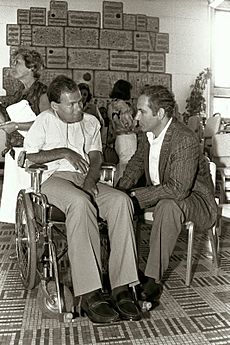
Leader of the Opposition (1993–1996)
Before the 1988 Israeli elections, Netanyahu joined the Likud party. He was elected to the Knesset, Israel's parliament, and served as a deputy foreign minister. During the Gulf War in 1991, Netanyahu became a key spokesperson for Israel in media interviews because he spoke English fluently. He was also part of the Israeli team at the Madrid Conference of 1991, which aimed for peace in the Middle East.
After the Likud party lost the 1992 elections, Netanyahu was chosen as the party's leader in 1993. This made him the leader of the opposition.
Following the assassination of Prime Minister Yitzhak Rabin in 1995, new elections were called. Netanyahu became the Likud candidate for prime minister in the 1996 election. This was the first time Israelis directly elected their prime minister. Netanyahu won, becoming the youngest prime minister in Israel's history and the first to be born in the State of Israel. His victory was a surprise to many.
Prime Minister (1996–1999)
First Term
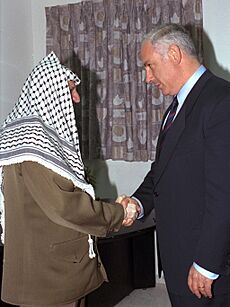
Before the 1996 election, there were several attacks in Israel. After the election, Netanyahu met with Palestinian President Yasser Arafat in September 1996. They continued to meet, leading to the signing of the Hebron Protocol in January 1997.
In 1996, Netanyahu and Jerusalem's mayor decided to open an exit for the Western Wall Tunnel. This led to protests and clashes, with people on both sides being killed.
Later, new talks led to the Wye River Memorandum in 1998, which outlined steps for Israel and the Palestinian Authority to follow. Netanyahu signed this agreement with Arafat. Netanyahu emphasized a policy of "three no's": no withdrawal from the Golan Heights, no discussion of Jerusalem, and no negotiations with preconditions.
During his first term, Netanyahu also started to make Israel's economy more open and free-market based. The government began selling its shares in banks and large state-owned companies. He also made it easier for Israelis to move money in and out of the country and invest abroad.
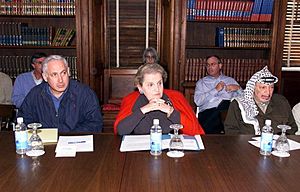
Netanyahu's government faced challenges, including attacks in Jerusalem. In 1997, a plan to capture a Hamas leader in Jordan was exposed, causing problems in relations with Jordan.
Netanyahu faced criticism during his term. He lost support from some groups due to his agreements with the Palestinians. He was defeated by Ehud Barak in the 1999 Israeli general election and left politics for a short time.
Time Away from Politics (1999–2003)
After losing the 1999 election, Netanyahu stepped away from politics. He worked as a senior consultant for a communications company for two years.
In 2002, after the Labor Party left the government, Prime Minister Ariel Sharon appointed Netanyahu as Foreign Minister. Netanyahu tried to become the leader of the Likud party again in 2002 but was not successful.
In September 2002, a speech by Netanyahu at Concordia University in Canada was canceled due to protests. He later spoke in Pittsburgh, where protests also took place.
Minister of Finance (2003–2005)
After the 2003 Israeli legislative election, Prime Minister Sharon offered Netanyahu the role of Finance Minister. Many people were surprised by this move. Netanyahu accepted the position.
As Finance Minister, Netanyahu worked on a plan to improve Israel's economy, which had been struggling. He believed that too much government control and rules were slowing down economic growth. His plan aimed for more free markets. He introduced programs to help people find jobs, reduced the size of the government, and froze government spending. He also cut taxes and sold off state-owned companies like banks and the national airline. Retirement ages were raised, and currency exchange rules were made more flexible.
These changes helped the Israeli economy grow, and unemployment went down. Many people praised Netanyahu for these economic improvements.
In 2004, Netanyahu threatened to resign if the plan to withdraw from Gaza was not put to a public vote. He later resigned on 7 August 2005, shortly before the government approved the first stage of withdrawal from Gaza.
Leader of the Opposition (2006–2009)
After Ariel Sharon left the Likud party, Netanyahu became its leader again on 20 December 2005. In the March 2006 elections, Likud came in third place, and Netanyahu served as Leader of the Opposition. In August 2007, he was re-elected as the chairman of Likud.
He did not support joining the government that Tzipi Livni tried to form, and instead pushed for new elections, which happened in February 2009. In the 2009 election, Likud won the second-highest number of seats. Netanyahu claimed victory because right-wing parties together won most of the votes. On 20 February 2009, President Shimon Peres asked Netanyahu to form a new government.
Netanyahu formed a government with other parties, including the Israeli Labor Party. His cabinet was approved by the Knesset on 31 March 2009, and he became prime minister again.
Prime Minister (2009–2021)
Second Term
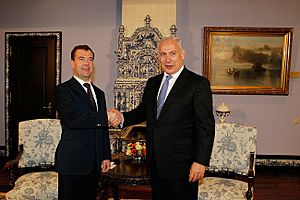
In 2009, U.S. Secretary of State Hillary Clinton supported the idea of a Palestinian state. Netanyahu, however, said that any peace talks would require Palestinians to recognize Israel as a Jewish state.
In June 2009, Netanyahu gave a speech at Bar-Ilan University. He said he would accept a Palestinian state if Jerusalem remained Israel's united capital, Palestinians had no army, and they gave up their demand for a right of return. He also said that existing Jewish settlements in the West Bank should be allowed to grow naturally. This was the first time he publicly supported the idea of a Palestinian state alongside Israel.
His speech received mixed reactions. Palestinian officials rejected his conditions, while some international leaders saw it as a step forward.
In November 2009, Netanyahu announced a partial 10-month freeze on building new settlements. He called it a "painful step" to encourage peace. However, Palestinians rejected it, saying it was not enough.
In March 2010, Israel's government approved building more apartments in East Jerusalem. This happened during a visit by U.S. Vice-president Joe Biden, and the U.S. government strongly criticized the decision. Netanyahu said that previous Israeli governments had always allowed building in these areas.
In September 2010, Netanyahu agreed to direct peace talks with the Palestinians, with the U.S. helping. The goal was to create a "final status settlement" for the Israeli–Palestinian conflict and a two-state solution.
In 2011, large protests about the high cost of living took place across Israel. Netanyahu appointed a committee to study the problems and suggest solutions. His government also approved a plan to build a fiber-optic cable network for fast internet access across the country.
In 2012, Netanyahu recognized for the first time in an official document the right for Palestinians to have their own state, though he said it must be demilitarized. In October 2012, his Likud party merged with Yisrael Beiteinu to run together in the 2013 elections.
Third Term
The 2013 election resulted in Netanyahu's coalition winning fewer seats. President Shimon Peres asked him to form the Thirty-third government of Israel. During this term, Netanyahu continued his economic policies. In December 2013, a law was passed to increase competition in Israel's economy and lower prices. This law aimed to prevent large companies from controlling too much. Netanyahu also started to privatize ports to reduce costs and increase trade.
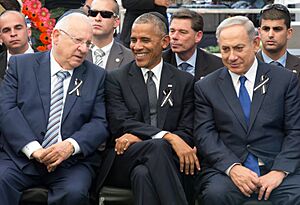
In 2014, Netanyahu expressed concerns when Hamas and the Palestinian Authority formed a unity government. He blamed Hamas for the kidnapping and murder of three Israeli teenagers in June 2014. This led to increased conflict in Gaza, and Israel started Operation Protective Edge.
In October 2014, Netanyahu's government approved a plan to privatize parts of state-owned companies. He also said that criticism of Israeli settlements was "against American values," leading to tension with the U.S. government.
In December 2014, Netanyahu dismissed two ministers, leading to the government's collapse and new elections in March 2015.
Netanyahu gave a speech to the United States Congress in March 2015. Leading up to the speech, there were discussions about its timing and whether it should happen without the U.S. administration's full support.
As the 2015 Israeli elections approached, Netanyahu stated that a Palestinian state would not be established during his term. However, he later clarified that he wanted a "peaceful, sustainable two-state solution."
Fourth Term
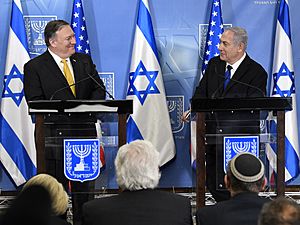
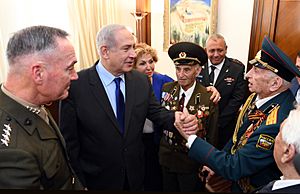
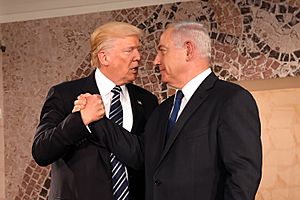
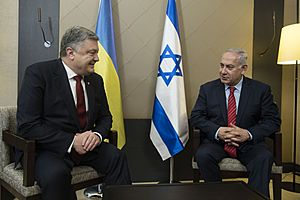
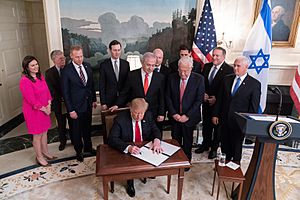
In the 2015 election, Netanyahu's Likud party won the most seats. He formed a new government coalition in May 2015.
In August 2015, his government approved a two-year budget that included reforms to lower food prices and housing costs.
In October 2015, Netanyahu made a controversial statement about the Grand Mufti of Jerusalem and Adolf Hitler, which was criticized by historians.
In December 2016, the United Nations Security Council passed a resolution about Israeli settlements. The United States, under the Obama administration, did not vote against it, which allowed it to pass. Netanyahu strongly criticized this decision.
In February 2017, Netanyahu became the first serving prime minister of Israel to visit Australia. In October 2017, his government announced it was leaving UNESCO due to what it saw as anti-Israel actions.
In April 2018, Netanyahu accused Iran of not following the Iran nuclear deal. He presented documents that he said showed the extent of Iran's nuclear program.
In July 2018, the Knesset passed the Nation-State Bill, which was supported by Netanyahu's government.
Before the April 2019 Israeli legislative election, Netanyahu helped create a deal to unite some right-wing parties.
Fifth Term
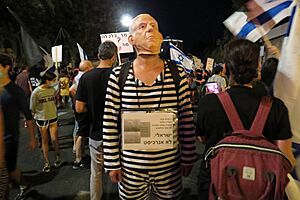
On 17 May 2020, Netanyahu was sworn in for a fifth term as prime minister, forming a coalition government. During this time, protests against him took place, especially during the COVID-19 pandemic in Israel. By March 2021, Israel had one of the highest vaccination rates against COVID-19 in the world.
In May 2021, after tensions in Jerusalem, Hamas fired rockets at Israel. Netanyahu responded by starting Operation Guardian of the Walls, which lasted eleven days. In June 2021, a new coalition government was formed, and Netanyahu was no longer prime minister, ending his 12-year continuous term.
Leader of the Opposition (2021–2022)
After his second time as prime minister, Netanyahu became the leader of the opposition again. His Likud party remained the largest party in the Knesset. He led the opposition into the 2022 Israeli legislative election.
Prime Minister (2022–Present)
Sixth Term
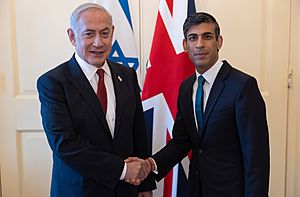
After the 2022 election, Netanyahu was sworn in as prime minister again on 29 December 2022, leading a new government.
The first months of his sixth term focused on proposed changes to the judicial system. Critics worried about how these changes would affect the balance of power in Israel's government. Large public protests took place across Israel. In March 2023, Netanyahu agreed to delay the new laws for a month.
In February 2023, the government approved the legalization of nine Israeli outposts in the occupied West Bank. In March 2023, a 2005 law that led to the dismantling of four Israeli settlements was repealed. In June 2023, the process for approving settlement construction was shortened.
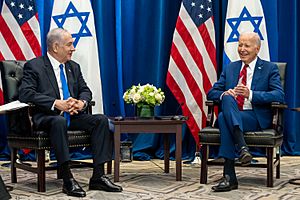
On 7 October 2023, after attacks by Palestinian militants from Gaza, Netanyahu announced that Israel was in a state of war against Hamas. He urged Gaza residents to leave areas where Hamas was active. He also suggested forming an emergency unity government with opposition parties.
Netanyahu has faced protests in Israel calling for his removal. In November 2023, he rejected calls for a ceasefire in the war and said Israel would "stand firm against the world if necessary." He stated that the Israel Defense Forces would remain in Gaza "as long as necessary."
In July 2024, Netanyahu spoke to a joint session of the United States Congress to ask for support for the Gaza war. He pledged "total victory" in Gaza.
In October 2024, a drone attack, believed to be from Lebanon, was made on Netanyahu's home. He was not there at the time, and no one was hurt. Netanyahu accused Hezbollah of trying to harm him.
In November 2024, Netanyahu dismissed his defense minister, which led to protests in Israel. In March 2025, he dismissed the head of Shin Bet, Israel's security agency.
On 13 June 2025, Netanyahu authorized airstrikes against Iran, starting the Iran–Israel war. He said the goal was to remove Iran's nuclear abilities and framed the campaign as a chance for political change in Iran.

Political Views
Israeli–Palestinian Conflict
Netanyahu has had strong views on the Israeli–Palestinian conflict. He did not support the Oslo Accords when they were first made. In his 1993 book, he argued against the peace process.
He has often said that Israel should not give up territory without strong security measures. He pointed to past withdrawals from Lebanon and Gaza, which he said led to rocket attacks. He believes that any peace agreement must include recognition of Israel as a Jewish state and strong security arrangements.
Netanyahu has also suggested an "economic peace" approach, focusing on economic cooperation to build trust, rather than only on political issues. He discussed these ideas with former U.S. Secretary of State Condoleezza Rice.
In 2014, he said that Jewish settlers should be allowed to stay in their homes under Palestinian rule. He also stated that Arabs and Jews in Jerusalem should be able to buy homes wherever they want.
For years, Netanyahu supported financial aid from Qatar to Gaza. He stated in 2019 that this was part of a strategy to keep Palestinians in Gaza separate from those in the West Bank.
In January 2020, Netanyahu publicly supported the Trump peace plan for Israelis and Palestinians.
The U.S.-brokered Abraham Accords led to Israel normalizing relations with the United Arab Emirates and Bahrain in 2020. This was a major step, as these were the first Arab countries to normalize ties with Israel since Jordan in 1994. Sudan and Morocco also established relations with Israel later that year.
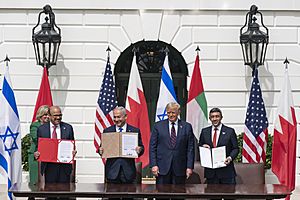
Economic Views
Netanyahu is known for his support of free-market economics. In 1999, he said that "peace, without free markets, will not produce growth." As prime minister in his first term, he made significant changes to the banking sector, making it easier to invest abroad.
As Finance Minister (2003–2005), he led a major overhaul of the Israeli economy. He introduced programs to help people move from welfare to work, privatized state-owned companies, and reduced the size of the government. He also simplified the tax system and passed laws against monopolies to increase competition. These changes led to economic growth and lower unemployment.
Netanyahu believes that capitalism, which allows individuals and businesses to compete and produce goods for profit, is important for growth. He says his views developed when he worked as an economic consultant.
Views on Counter-Terrorism
Netanyahu has a strong stance against terrorism, partly due to his brother Yoni being killed during a hostage rescue mission.
He has written books about fighting terrorism. He sees terrorism as a form of control, where the goal is to create fear by attacking innocent people. He believes that governments should not confuse terrorists with political groups that use debate to achieve their goals.
Netanyahu suggests that stricter immigration laws can help prevent terrorism. He also believes there is a balance between protecting civil liberties and ensuring security, which should depend on the level of terrorist threats.
LGBT Rights
Netanyahu supports equal rights for LGBT (lesbian, gay, bisexual, and transgender) people. He has said that Israel is one of the most open countries regarding the LGBT community. He believes that every person should be treated equally.
Ethiopian Jewish Integration
In 2015, after protests by Ethiopian Jews about police treatment, Netanyahu stated that there is no place for racism or discrimination in Israeli society. He promised to work on a plan to help integrate the Ethiopian Jewish community.
Iran
Netanyahu has often spoken about the threat of Iran developing nuclear weapons. In 2009, he described Iran as the biggest threat Israel has ever faced. He believes that Iran's government is driven by extreme views and that the world must prevent it from getting nuclear weapons.

In 2012, Netanyahu and Defense Minister Ehud Barak considered possible military action against Iran's nuclear facilities. Netanyahu has used a "red line" to show the point at which Iran's uranium enrichment would become an unacceptable risk for Israel.
In 2020, Netanyahu praised the U.S. military strike that killed Iranian General Qasem Soleimani.
On 13 June 2025, Netanyahu authorized airstrikes against Iran, starting the Iran–Israel war. He stated that the goal was to dismantle Iran's nuclear capabilities, which he called a "clear and present danger."
Defense and Security
In 2011, Netanyahu arranged a prisoner exchange where 1000 Hamas and Fatah prisoners were released in exchange for Israeli soldier Gilad Shalit.
He has emphasized the importance of Israel's National Security Council in planning foreign policy. During the Gaza war, he said Israel must maintain "overall security responsibility" over the Gaza Strip.
Immigration Policy
In his 1995 book, Netanyahu argued that stricter immigration laws in Western countries are important for fighting terrorism.
In 2012, his government passed a law that allowed for the detention of people who entered Israel without permission, including asylum-seekers. This law was criticized by human rights groups. Netanyahu has also urged European leaders to control their borders more strictly to prevent illegal immigration.
Relationships with Foreign Leaders
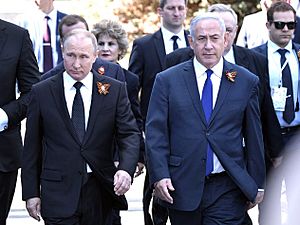
Netanyahu has built close relationships with many foreign leaders during his time as prime minister. He has a close relationship with Hungarian prime minister Viktor Orbán.
He also had a friendly relationship with former Italian prime minister Silvio Berlusconi. Netanyahu and Indian prime minister Narendra Modi developed a close bond, and ties between India and Israel grew stronger during their leadership.
Netanyahu has had a warm relationship with Russian President Vladimir Putin, though this has been strained since the start of the Gaza war.
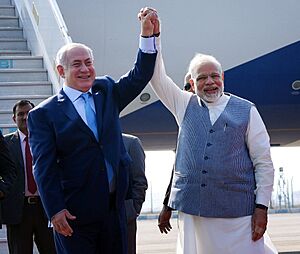
In 2018, a new Polish law about historical events caused tension between Israel and Poland. Netanyahu called a comment by the Polish prime minister "outrageous." The issue was later resolved with a joint statement.
Netanyahu has developed a close relationship with Brazilian President Jair Bolsonaro and Argentinian president Javier Milei.
His relationship with Turkish President Recep Tayyip Erdoğan has been tense. In 2019, they exchanged strong words, with Netanyahu calling Erdoğan a dictator and Erdoğan calling Netanyahu a "tyrant."
US Leaders
Netanyahu has close ties with leaders of the U.S. Republican Party. He became friends with Mitt Romney when they worked together in the 1970s.
His relationship with U.S. President Barack Obama was sometimes difficult. In 2011, then-French president Nicolas Sarkozy was heard saying he couldn't stand Netanyahu, and Obama reportedly agreed. In 2014, a U.S. official anonymously criticized Netanyahu, leading to further tension.
Netanyahu and U.S. President Donald Trump have known each other for many years. Netanyahu was friends with Trump's father in the 1980s. In 2013, Trump endorsed Netanyahu during Israeli elections. In 2019, a settlement in the Golan Heights was renamed "Trump Heights" after Donald Trump. However, their relationship became strained after Netanyahu congratulated Joe Biden on winning the 2020 U.S. presidential election.
U.S. President Joe Biden has been friendly with Netanyahu for many years, with their relationship dating back decades. However, in 2024, their relationship became strained over Israel's actions in Rafah.
Personal Life
Family
| Nathan Mileikowsky (1879–1935) Writer, Zionist activist |
Sarah Lurie | ||||||||||||||||||||||||||||||||
| Tzila Segal (1912–2000) |
Benzion Netanyahu (1910–2012) Historian |
Elisha Netanyahu (1912–1986) Mathematician |
Shoshana Shenburg (1923–2022) Supreme Court justice |
||||||||||||||||||||||||||||||
| Yonatan Netanyahu (1946–1976) Military Commander |
Benjamin Netanyahu (1949–) |
Iddo Netanyahu (1952–) Physician, playwright |
Nathan Netanyahu (1951–) Computer scientist |
||||||||||||||||||||||||||||||
Marriages and Children
Netanyahu has been married three times. His first marriage was to Miriam Weizmann, whom he met in Israel. They had one daughter, Noa (born 1978).
In 1981, Netanyahu married Fleur Cates. She converted to Judaism. They divorced in 1988.
His third wife is Sara Ben-Artzi, whom he married in 1991. They have two sons: Yair (born 1991) and Avner (born 1994). Avner is a national Bible champion.
Health
Netanyahu has had some health issues. He has had a heart condition since around 2003. In July 2023, he had a pacemaker implanted. A hernia was found in March 2024. In December 2024, he had prostate surgery.
See also
 In Spanish: Benjamín Netanyahu para niños
In Spanish: Benjamín Netanyahu para niños
- List of international prime ministerial trips made by Benjamin Netanyahu
- List of Israeli politicians
 | Madam C. J. Walker |
 | Janet Emerson Bashen |
 | Annie Turnbo Malone |
 | Maggie L. Walker |


